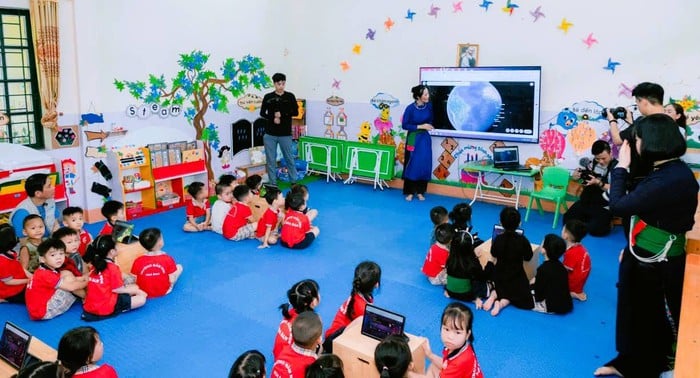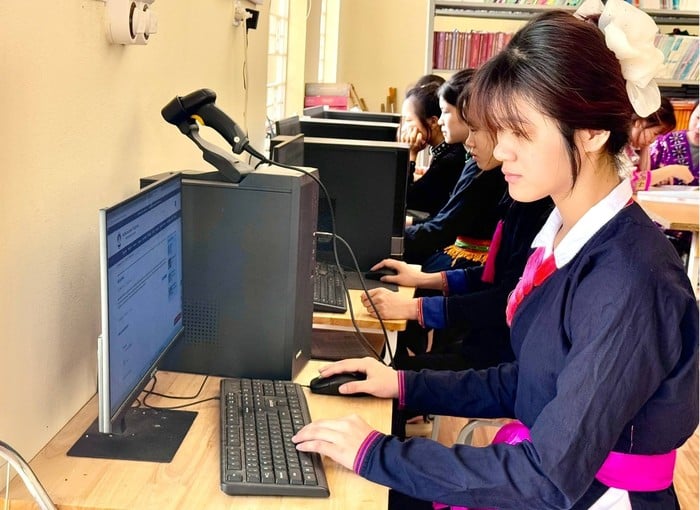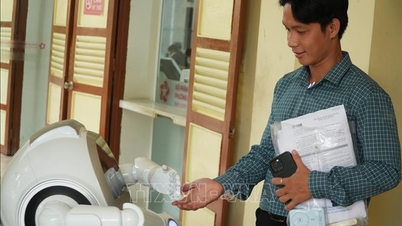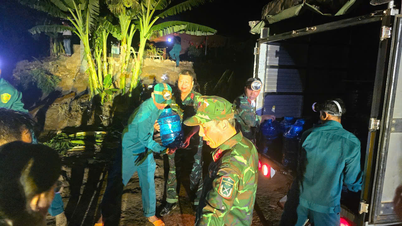The Department of Education and Training (DoET) of Lao Cai province has focused on directing the Departments of Education and Training (DOET) and educational institutions across the province to implement many solutions to complete the industry database, ensuring accurate, complete and timely data.
Review, compare and standardize data on management staff, teachers and employees (personal information, training level, seniority, expertise...); update and clean data on students, including personal information, learning process, academic results, training, and preferential policies enjoyed; 100% of units maintain a regular data update schedule, ensuring continuity and accurately reflecting the current status of educational activities; gradually complete data on school facilities (classrooms, functional rooms, equipment, area, usage status).
The Department of Education and Training continues to closely coordinate with the Provincial Police and related units to match student data with the National Population Database, ensuring the accuracy and consistency of personal information. Effectively use personal identification codes of students, staff, teachers and employees in management, examination and certification activities. Deploy the connection of high school graduation exam scores, university and college admission data with the systems of the Ministry of Education and Training . The Department's specialized departments and offices have initially effectively exploited data from the industry database to analyze and evaluate the current state of education, serving the work of consulting, policy planning and decision making.
The 2024-2025 school year is a pivotal year in the digital transformation roadmap of Lao Cai province's education sector. With the close direction of the Ministry of Education and Training, the Provincial Party Committee, the Provincial People's Committee, the Department of Education and Training has actively implemented projects and solutions to promote the application of information technology, artificial intelligence (AI) and Big Data mining in all management, teaching and learning activities, towards building a smart, modern education system.
The Department of Education and Training continues to invest in and upgrade the high-speed Internet transmission system to 100% of educational institutions, ensuring stable connections for online teaching, learning and management activities. School management systems (VnEdu, SMAS...) are used effectively in managing student records, scores, electronic transcripts, electronic contact books, helping to make information transparent and reduce administrative procedures. Teachers are encouraged to build and share digital learning materials (electronic lectures, video lectures, simulation software, online exams) on shared platforms of the industry and the school.
During the school year, realizing the great potential of AI and Big Data, the Department of Education and Training has proactively researched, piloted and oriented the application of these technologies; teachers have been trained and encouraged to use AI tools to support lesson planning, create exercises, questions, or suggest teaching methods suitable for each student; Using AI to support students in self-study by introducing learning platforms with integrated AI such as language practice tools, question-answering chatbots, or personalized learning applications, helping students self-study more effectively.
Identifying the provision and encouragement of the use of online public services (DVCTT) as one of the top priorities to modernize the administration and better serve the people. The Department of Education and Training has reviewed and put 114 administrative procedures (46 full online procedures, 68 partial online procedures) related to the education sector on the provincial and national public service portals at levels 3 and 4. Common procedures such as issuing copies of diplomas and certificates, registering for exams, enrolling at the beginning of the school year, transferring schools... have been digitized.

Deploying digital transcripts to 100% of primary education institutions according to the technical model that has been adjusted, updated, and supplemented after the pilot phase.
Organize training sessions, provide guidance for staff, teachers, employees and parents on how to register, submit documents, and look up results online. Information channels such as the website, fanpage of the Department and schools also regularly post detailed instructions. This helps reduce time and travel costs for people and improve the efficiency of administrative procedures.
Along with that, the Department of Education and Training has deployed Digital Student Report Cards to general education and continuing education institutions. Of which, the primary level has deployed Digital Student Report Cards to 100% of primary education institutions according to the technical model that has been adjusted, updated, and supplemented after the pilot phase.
For junior high school, high school and continuing education levels, pilot implementation will be implemented in 100% of secondary and continuing education institutions.
Up to now, educational institutions have initiated digital transcripts and are preparing to test the connection with the Ministry's digital transcript database upon completing the connection portal between the Department of Education and Training and the Ministry's digital transcript database.
It can be said that the Digital Student Report Card is one of the important components of the industry database, helping to manage student information in a centralized, transparent and secure manner. The Digital Student Report Card helps to store information permanently, making it easy to look up, share and secure. At the same time, this is an important database for admissions at all levels, minimizing errors and fraud.
The Department of Education and Training has also developed a digital learning materials warehouse and question bank to innovate teaching and learning methods, supporting teachers and students to access rich resources. Teachers are encouraged to create and contribute electronic lectures, video lectures, reference materials, simulation software, images, sounds, etc. in accordance with the 2018 General Education Program. Focus on building standardized question banks for each subject and grade level, closely following the requirements of the 2018 General Education Program and the orientation of the high school graduation exam.

Schools in Lao Cai province have selected and deployed appropriate online teaching platforms to serve teaching and learning.
Question banks are used by educational institutions to create periodic tests and mock exams, helping to assess students' abilities objectively and diversely.
Schools in Lao Cai province have selected and deployed appropriate online teaching platforms (such as Google Classroom, Microsoft Teams or other specialized platforms) to serve teaching and learning. Teachers have used the platforms to assign assignments, organize supplementary online lessons, conduct assessments, and interact with students. Regular training sessions are organized for teachers and students on how to effectively use the online teaching platform, ensuring that everyone can access it.
The positive results of digital transformation have contributed to improving the quality of education, increasing students' access to knowledge, and improving the effectiveness of educational management, gradually building a smart and modern education system, narrowing the gap between regions.
Source: https://phunuvietnam.vn/lao-cai-xay-dung-nen-giao-duc-thong-minh-hien-dai-nho-ung-dung-chuyen-doi-so-20250730155434558.htm
















































![[Video] Hue Monuments reopen to welcome visitors](https://vphoto.vietnam.vn/thumb/402x226/vietnam/resource/IMAGE/2025/11/05/1762301089171_dung01-05-43-09still013-jpg.webp)













































![Dong Nai OCOP transition: [Part 2] Opening new distribution channel](https://vphoto.vietnam.vn/thumb/402x226/vietnam/resource/IMAGE/2025/11/09/1762655780766_4613-anh-1_20240803100041-nongnghiep-154608.jpeg)













Comment (0)